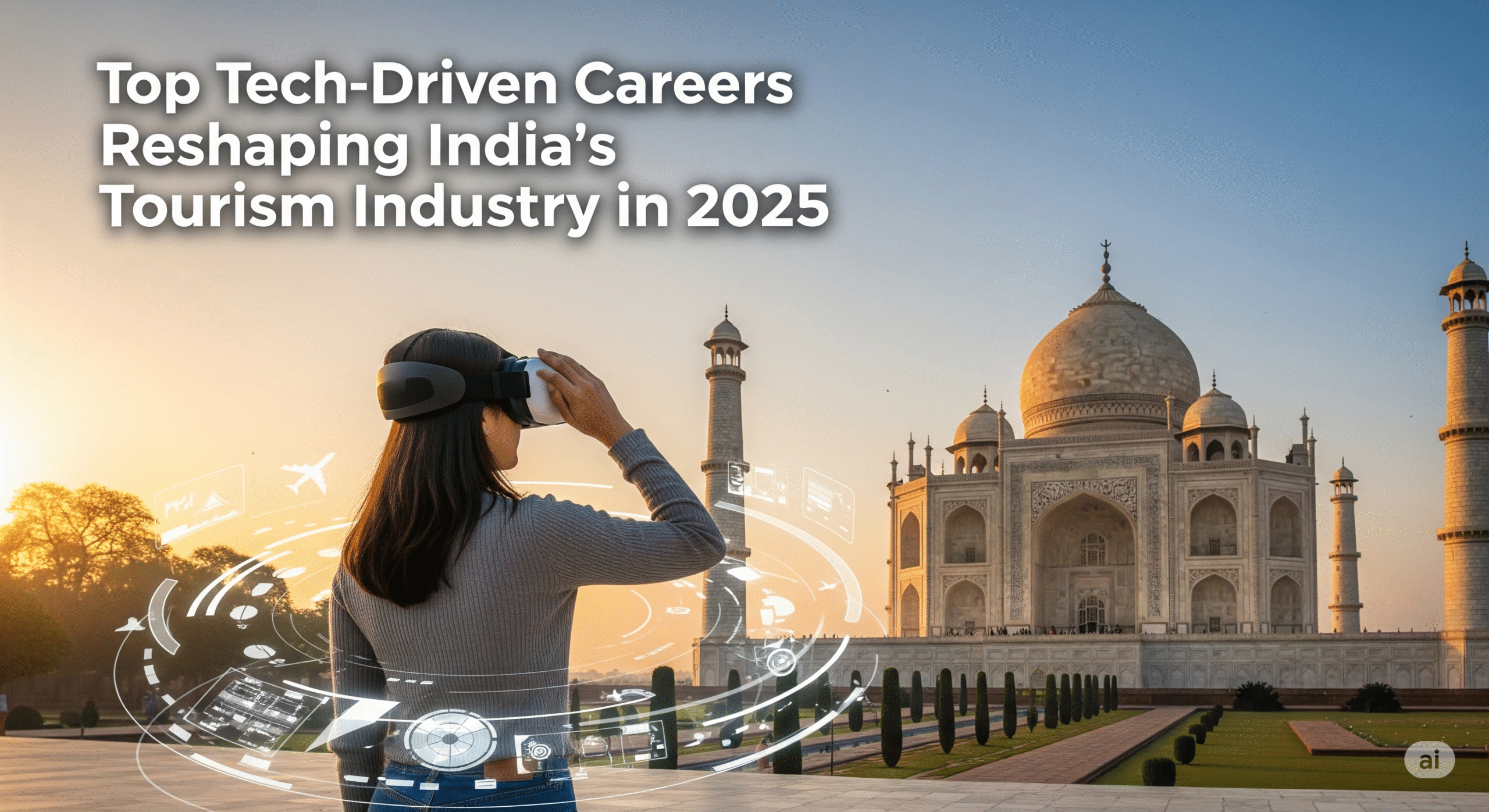Introduction to India’s Evolving Tourism Industry & Top Tech-Driven Careers
From Heritage to High-Tech: The Tourism Shift
India’s tourism industry, once celebrated purely for its rich heritage, cultural diversity, and natural beauty, is now undergoing a profound transformation. While historical monuments, pilgrimage sites, and vibrant local markets remain major attractions, the sector is increasingly embracing cutting-edge technologies to enhance visitor experiences.
From virtual reality tours of heritage sites to AI-powered travel assistants, these innovations are reshaping how tourists plan, book, and enjoy their journeys.
This digital shift is not just improving convenience for travelers but is also opening up new, high-growth career paths for professionals with the right blend of hospitality expertise and technological skills.
Why Technology is Becoming the Backbone of Tourism
Technology has become the backbone of modern tourism by making travel faster, safer, and more personalized than ever before. Digital booking platforms allow travelers to compare prices instantly, while AI-driven chatbots provide 24/7 travel assistance in multiple languages.
Virtual reality (VR) and augmented reality (AR) offer immersive previews of destinations, helping visitors make informed choices before they even set foot there. Meanwhile, big data analytics helps tourism operators predict travel trends, manage crowds, and design tailored experiences.
In India, this tech integration is particularly impactful because it bridges the gap between traditional tourism charm and the demands of digitally savvy travelers, ensuring the sector remains competitive on a global scale.
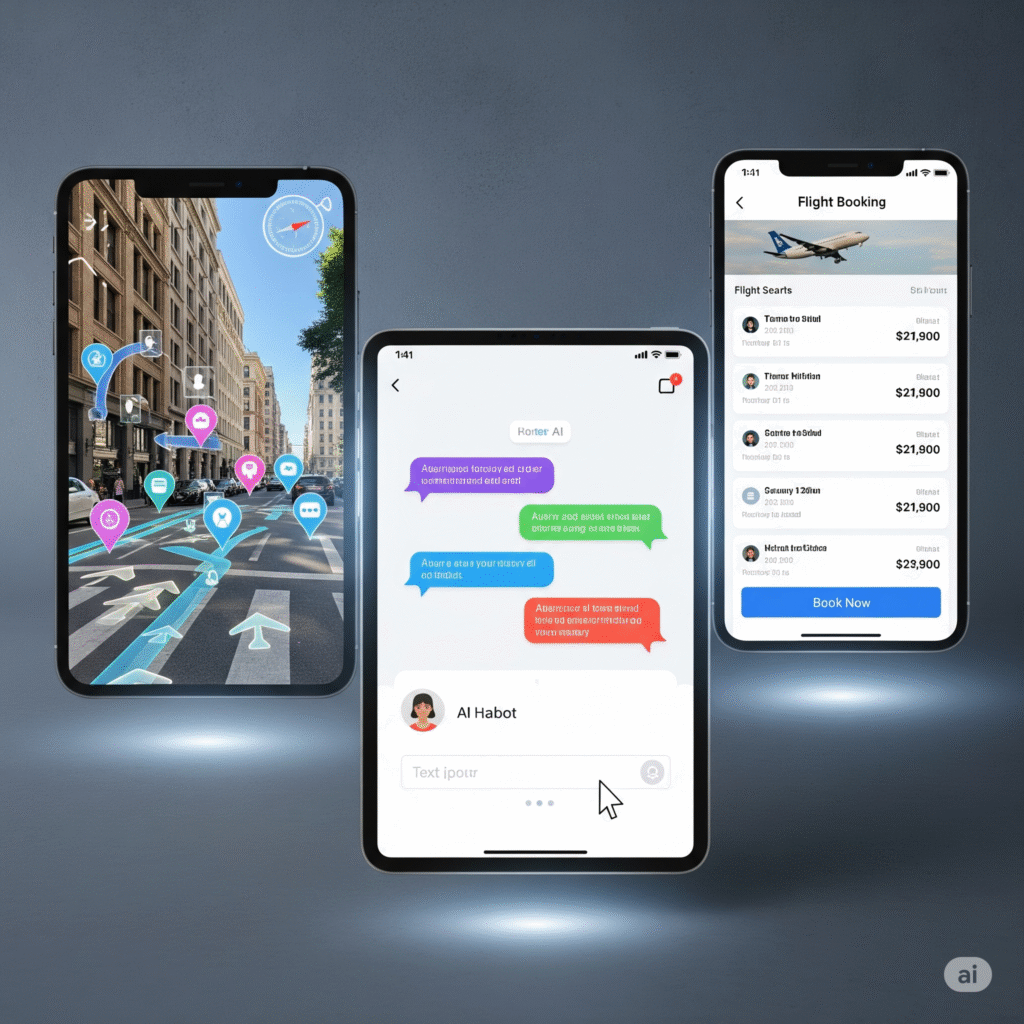
Government Initiatives Driving Tourism and Job Creation

Swadesh Darshan and PRASHAD Schemes
The Government of India has been a key driver in modernizing tourism infrastructure and creating employment opportunities through visionary programs like the Swadesh Darshan Scheme and the PRASHAD Scheme. The Swadesh Darshan Scheme focuses on developing theme-based tourist circuits such as the Buddhist Circuit, Desert Circuit, and Coastal Circuit, ensuring better connectivity, upgraded facilities, and sustainable development practices.
On the other hand, the PRASHAD Scheme (Pilgrimage Rejuvenation and Spiritual Heritage Augmentation Drive) is dedicated to enhancing the infrastructure of cultural and spiritual destinations, making them more accessible and appealing to domestic and international visitors. These initiatives not only improve the tourist experience but also generate thousands of direct and indirect jobs in hospitality, transportation, event management, and local crafts.
Hunar Se Rozgar Tak (HSRT) and Skill Development Programs
To strengthen the workforce behind India’s growing tourism industry, the Ministry of Tourism launched Hunar Se Rozgar Tak (HSRT) — a flagship skill development program aimed at empowering youth with job-ready hospitality skills.
HSRT offers short-term training courses in areas such as food production, bakery, housekeeping, and front office operations, enabling participants to find employment quickly in hotels, resorts, and travel agencies.
Complementing this, initiatives like the Incredible India Tourist Facilitator (IITF) Programme and Capacity Building for Service Providers (CBSP) provide certification and professional training for tourist guides, travel operators, and other service providers.
Together, these programs ensure that the tourism sector not only meets global service standards but also creates a steady pipeline of skilled professionals ready for the tech-driven demands of modern travel.
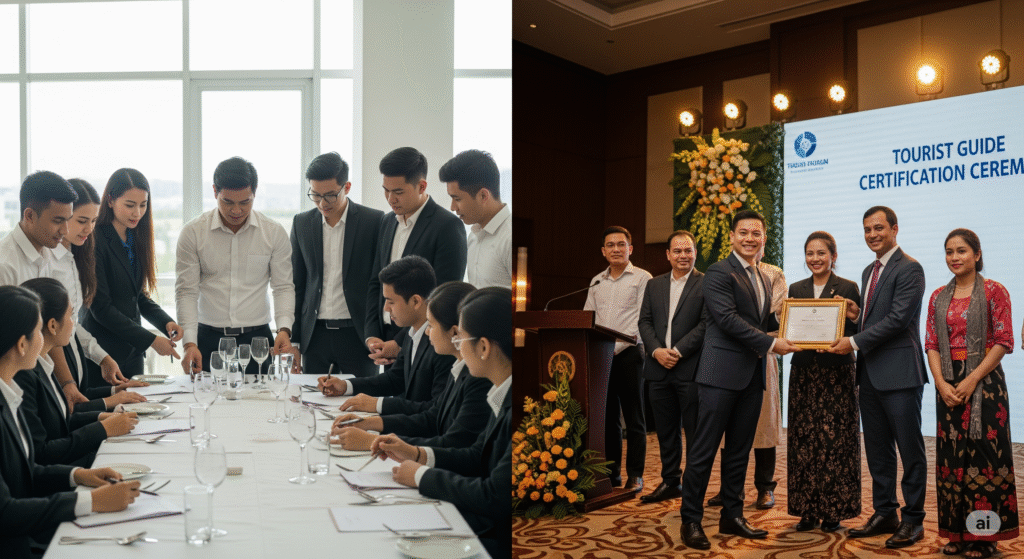
RCS-UDAN and Regional Connectivity Boost
The Regional Connectivity Scheme – UDAN (Ude Desh ka Aam Naagrik) has been a game-changer for India’s domestic tourism. Launched in 2017, UDAN’s primary goal is to make air travel affordable and accessible by connecting smaller cities and remote regions with major hubs.
This expansion of regional air connectivity has opened doors for tourism in lesser-known destinations, creating fresh job opportunities in airports, hospitality, local transport, and guided tours. For tech-savvy professionals, the rise in passenger traffic also fuels demand for digital ticketing systems, airport IoT solutions, and smart tourism management platforms.
In essence, UDAN not only reduces travel time but also expands the tourism employment map to areas that were once considered off-grid.
Also Read: India Employment Report 2025: Jobs Growth Hits Record High, Unemployment Falls to 3.2%
Tourism as a Major Employment Generator
India’s tourism sector is not just about leisure—it’s one of the country’s largest employment generators. In 2023 alone, the nation welcomed 18.89 million international tourists and recorded over 2.5 billion domestic tourist visits, contributing ₹231,927 crore in foreign exchange earnings.
According to the World Travel and Tourism Council (WTTC), the industry has the potential to support over 100 million jobs by 2030 if growth continues at the current pace. Beyond traditional hospitality roles, emerging segments such as wellness tourism, eco-tourism, medical value tourism, and inland cruise tourism are driving demand for specialized skills in healthcare support, event management, sustainability, and technology integration.
This massive employment potential positions tourism as a strategic pillar in India’s economic growth story.
Job Potential by 2030 (WTTC Data)
The World Travel and Tourism Council (WTTC) forecasts that India’s tourism industry could support over 100 million jobs by 2030, making it one of the most significant employment sectors in the country.
This growth will be fueled by rising disposable incomes, improved infrastructure, and global recognition of India as a diverse, affordable, and high-quality travel destination.
Jobs will range from on-ground services like hospitality and transport to technology-led roles in digital marketing, VR content creation, and tourism data analytics. Government-backed skill development schemes and industry collaborations are expected to ensure that professionals entering the field are future-ready for both traditional and tech-driven positions![]() .
.
High-Demand Segments – Wellness, Eco, Medical, and Cruise Tourism
Within the broader tourism ecosystem, certain segments are experiencing exceptional growth and generating specialized employment opportunities. Wellness tourism, driven by India’s Ayurveda, yoga, and naturopathy heritage, is attracting global travelers seeking rejuvenation retreats.
Eco-tourism is gaining traction as travelers opt for sustainable, nature-based experiences, creating jobs in wildlife guiding, conservation, and eco-lodge management. Medical value tourism continues to thrive, with India offering advanced healthcare at competitive costs, requiring roles in patient care, medical coordination, and healthcare logistics.
Finally, inland cruise tourism along rivers like the Ganga and Brahmaputra is creating demand for cruise operations, onboard entertainment, and marine hospitality staff. Together, these segments are reshaping employment patterns in tourism and encouraging professionals to acquire niche skills.
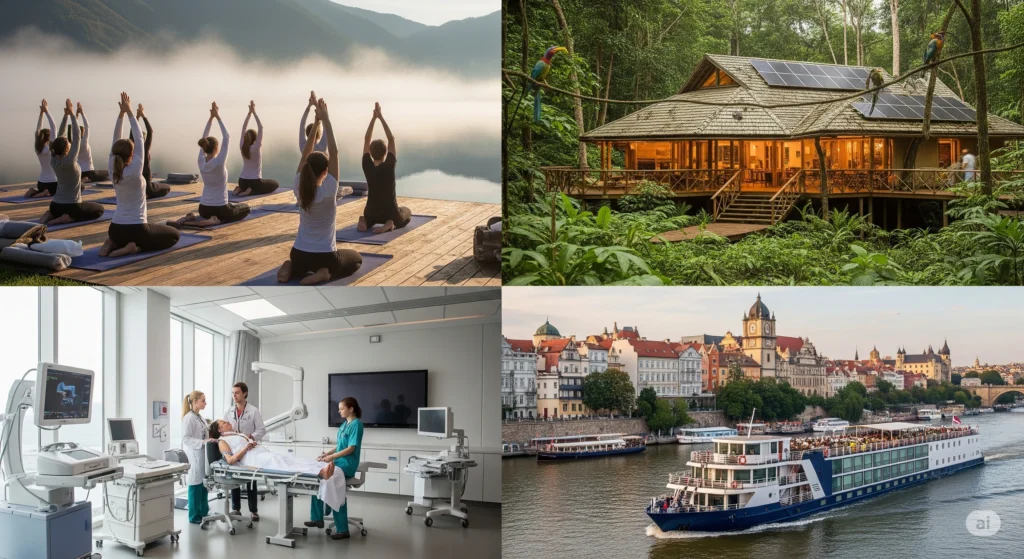
VR & AR Experience Developer
Virtual Reality (VR) and Augmented Reality (AR) are revolutionizing how travelers explore destinations before and during their trips. A VR & AR Experience Developer designs immersive digital experiences that allow tourists to take virtual heritage walks, explore 3D models of monuments, or overlay real-time AR guides onto their surroundings.
In India, this technology is being used in museums, historical sites, and tourism expos to attract global audiences. Career opportunities in this field require skills in Unity, Unreal Engine, 3D modeling, and UX design.
For tourism professionals, combining storytelling with tech expertise can lead to high-paying roles in both the public and private sectors.
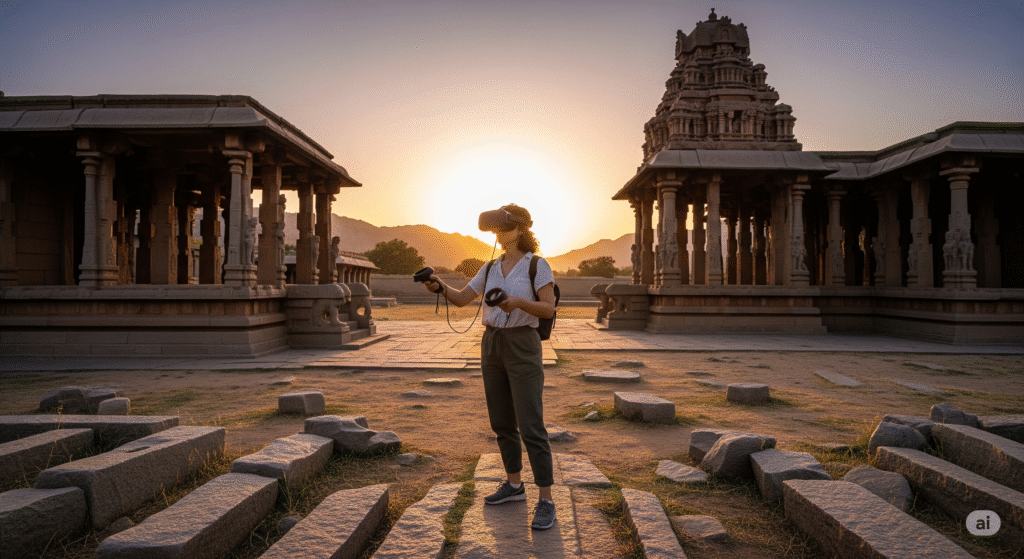
AI-Driven Travel Chatbot Specialist
AI-powered chatbots have become a 24/7 travel companion, helping tourists with bookings, itineraries, and instant problem-solving. An AI-Driven Travel Chatbot Specialist designs, trains, and manages these bots to offer personalized recommendations in multiple languages.
In India, government tourism portals, airlines, and private travel agencies are adopting chatbots to handle customer queries, ticket changes, and promotional campaigns.
Skills in Natural Language Processing (NLP), AI frameworks, and customer experience design are essential for this role. With global tourism trends moving towards hyper-personalization, chatbot specialists are in high demand.
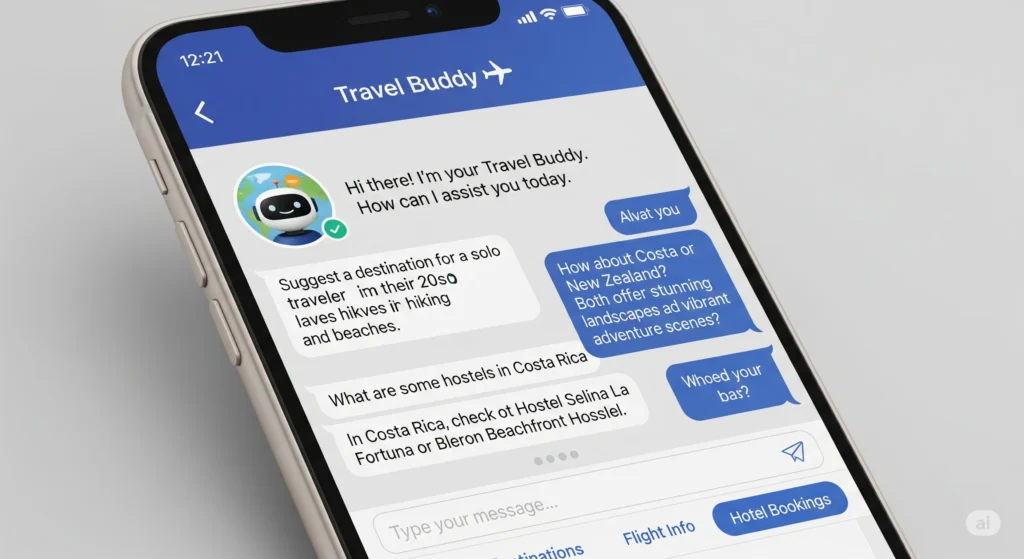
Big Data Analyst for Tourism Trends
In the age of data-driven decision-making, tourism companies are relying heavily on big data analytics to understand traveler behavior, forecast demand, and improve services. A Big Data Analyst for Tourism Trends collects and analyzes datasets from booking engines, travel apps, and social media platforms to identify patterns.
For example, during festivals or peak seasons, predictive analytics can help optimize hotel pricing, transport schedules, and marketing campaigns. Skills in SQL, Python, Tableau, and Google Data Analytics are highly sought after.
This role blends statistical expertise with an understanding of cultural and seasonal travel patterns, making it a strategic position in the tourism value chain.
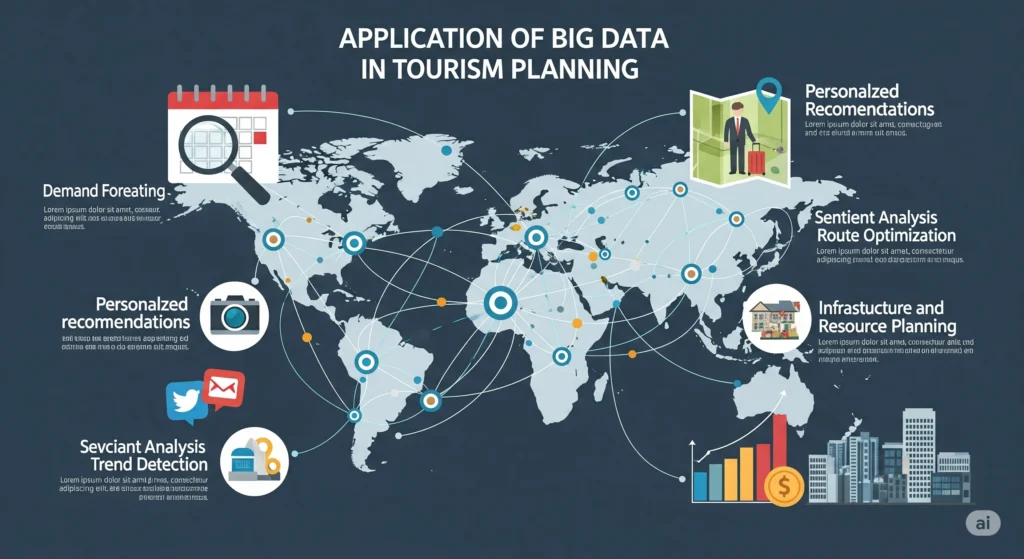
IoT & Smart Destination Manager
In the coming years, tourism destinations will increasingly rely on Internet of Things (IoT) technology to provide seamless and personalized experiences. An IoT & Smart Destination Manager will oversee the integration of smart devices, sensors, and data-driven solutions across hotels, attractions, and transport systems.
Their role may include managing smart ticketing systems, real-time crowd monitoring, and personalized tourist guides that adapt to visitor preferences. For example, a tourist arriving at a smart destination might receive instant updates on nearby attractions, wait times, and weather conditions via connected apps.
Professionals in this role will need a blend of technical skills, tourism management knowledge, and strong problem-solving abilities.
Drone Photographer/Videographer
Drones have revolutionized how destinations, resorts, and events are captured for promotional purposes. A Drone Photographer/Videographer in tourism specializes in aerial photography, videography, and live-streaming of destinations, festivals, and special events.
This role is in high demand for creating immersive marketing campaigns, virtual tours, and cinematic travel videos. From showcasing scenic landscapes to capturing bird’s-eye views of heritage sites, drone professionals can help tourism brands stand out in the digital space.
Knowledge of drone regulations, editing skills, and creative storytelling are essential.
Startup & Entrepreneurial Opportunities
AI-Powered Trip Planning Startups
With AI tools like ChatGPT and travel-specific algorithms, entrepreneurs can now create personalized trip planning platforms that suggest itineraries, accommodations, and experiences based on traveler preferences.
These startups can integrate real-time data for weather, pricing, and local events to optimize travel experiences. This niche has strong growth potential as travelers increasingly seek hyper-personalized journeys over generic packages.
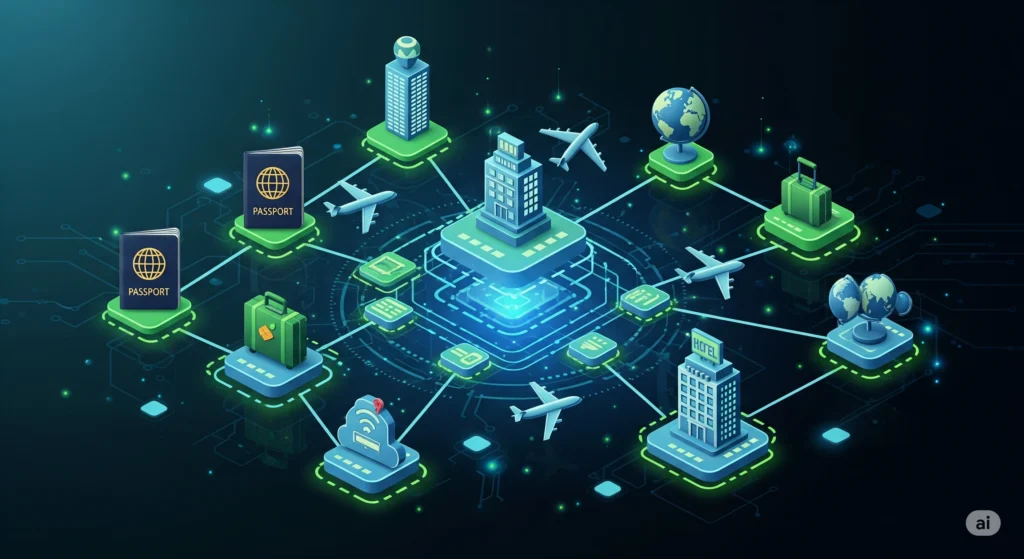
Blockchain-Based Secure Booking Solutions
Blockchain technology is being adopted in tourism to make payments, bookings, and traveler data storage more secure and transparent. This reduces fraud, eliminates middlemen, and ensures that transactions are recorded permanently on a decentralized ledger.
Startups in this space can offer services like NFT-based travel tickets, secure hotel bookings, and verified customer reviews. With growing concerns about cybersecurity, blockchain-based tourism services are gaining global attention.
Virtual Destination Tour Platforms
Virtual reality (VR) and augmented reality (AR) are allowing travelers to explore destinations before they even set foot there. These platforms let users take immersive 360° tours of cities, landmarks, and hotels, helping them make better booking decisions.
This is especially useful for elderly travelers, people with disabilities, or those researching destinations. The market for VR tourism is projected to grow rapidly with the rise of the metaverse.

Upskilling for a Future-Ready Tourism Career
Digital Marketing & E-Tourism Certifications
As tourism becomes more digital, online marketing skills like SEO, social media strategy, and paid ads are essential for professionals. E-Tourism certifications teach how to promote destinations, handle online bookings, and analyze customer behavior.
Completing these certifications can open doors to remote jobs and consultancy opportunities.
Sustainable Tourism & Green Certifications
Travelers are becoming more conscious of their environmental footprint. Sustainable tourism certifications help professionals learn how to develop eco-friendly travel packages, manage waste, and work with green-certified hotels. This growing field is backed by global tourism boards and NGOs.
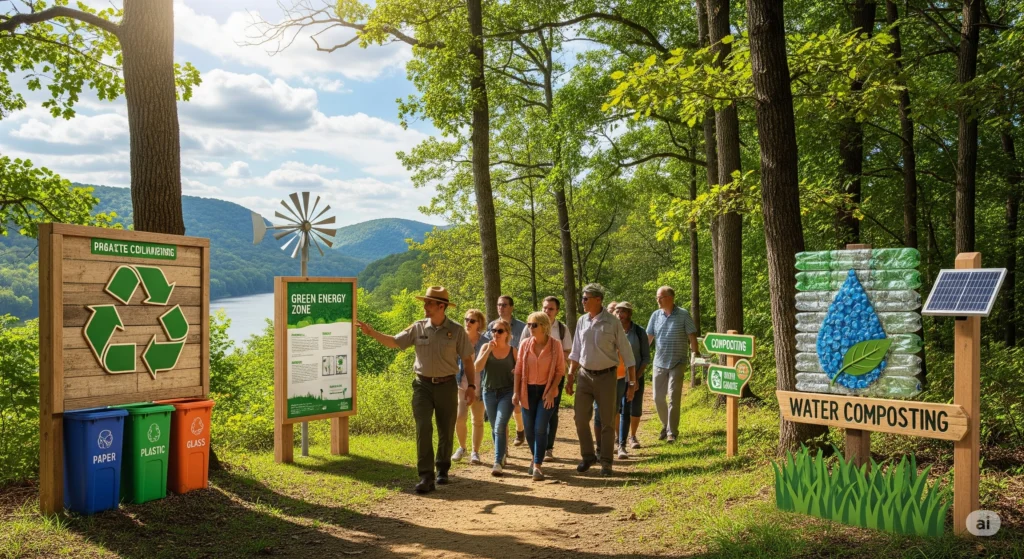
Data Analytics, VR/AR, and IoT Skills
The tourism sector now relies heavily on data analysis, immersive experiences, and connected devices to improve traveler satisfaction.
Skills in Google Analytics, AR app design, and IoT device integration can make you highly competitive. Many of these skills can be learned online for free or at low cost.
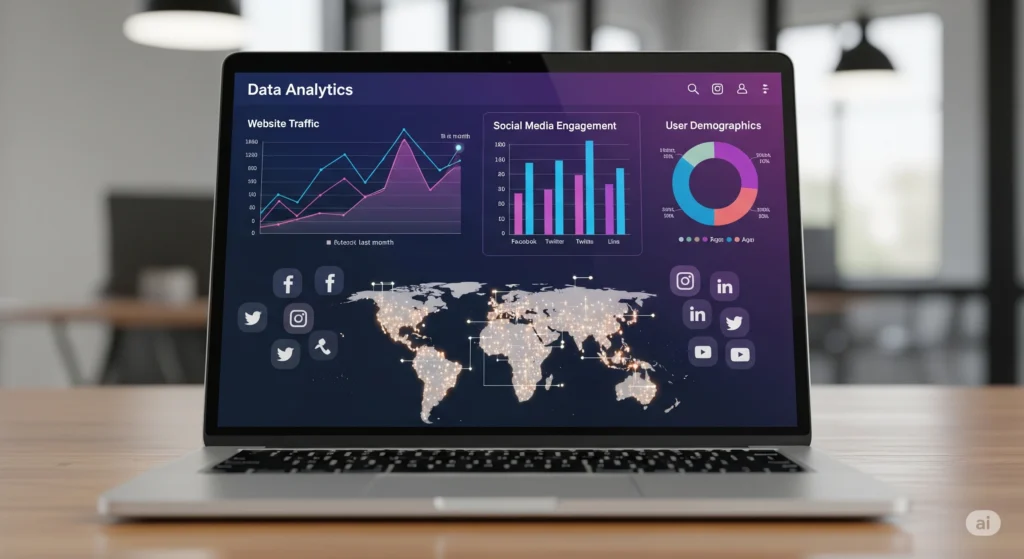
Platforms like SWAYAM, Coursera, and edX
E-learning platforms offer a range of free and paid tourism-related courses, from beginner to advanced levels.
SWAYAM (by the Indian government) provides UGC-approved courses, while Coursera and edX partner with global universities for professional certificates.
Industry-Recognized Certifications (Google, HubSpot, AWS)
Tech giants offer certifications that are respected globally and can boost your career in tourism tech. For example, Google Analytics for tourism websites, HubSpot for inbound marketing, and AWS for cloud-based tourism platforms.
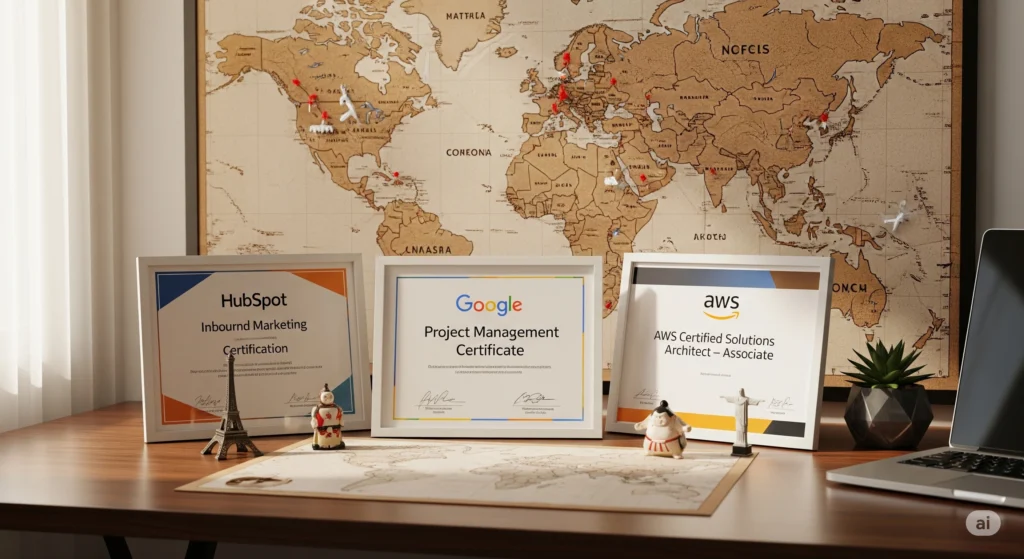
Conclusion
The future of tourism is tech-driven, sustainable, and highly personalized. By learning relevant skills, embracing digital tools, and obtaining industry certifications, professionals can build resilient careers in this evolving sector. Those who adapt early will lead the transformation of global travel.
